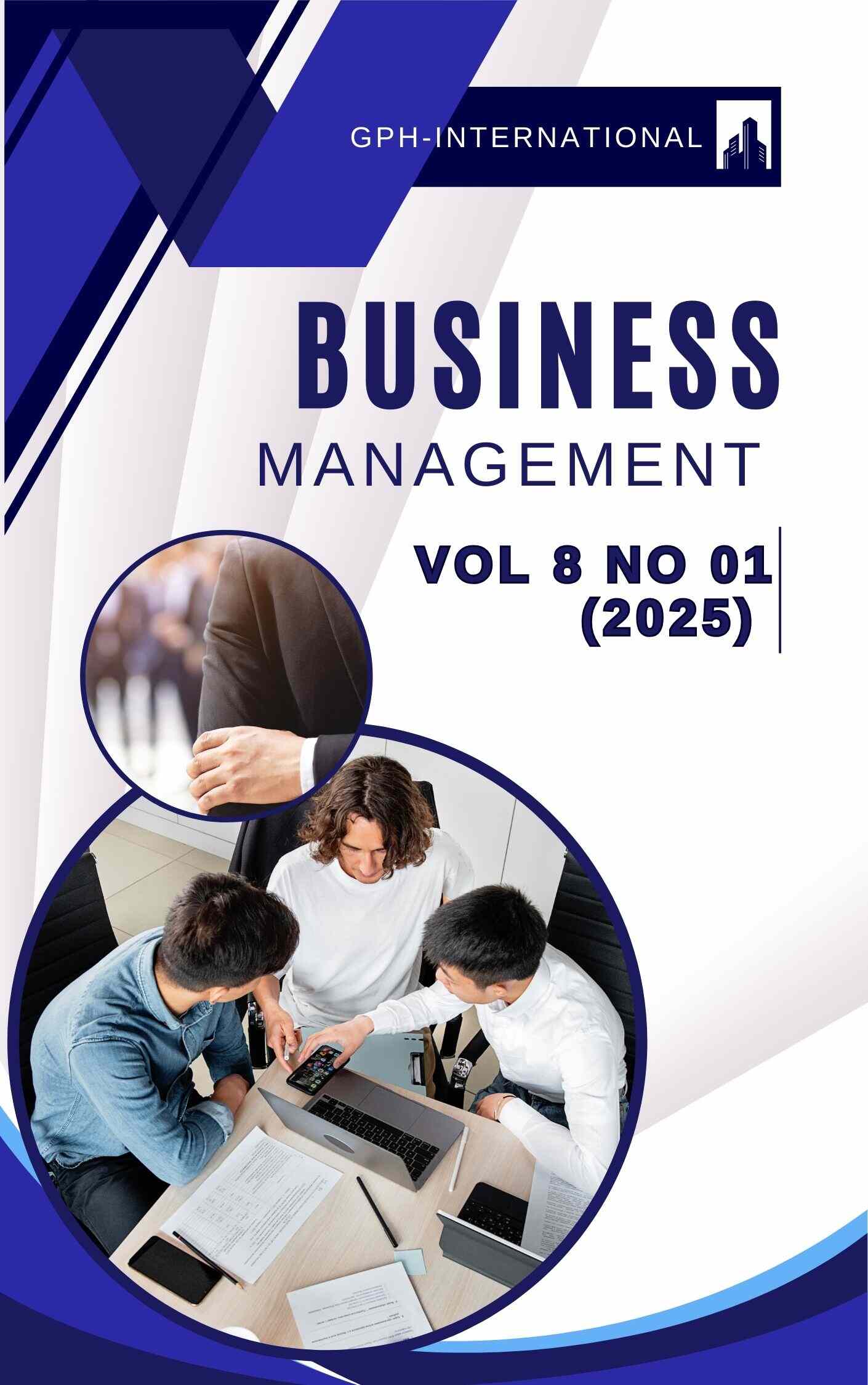Decoding Success: Key Drivers of Effective Remote Leadership in the Modern Workplace
Abstract
This study investigates the key challenges faced by virtual leaders and how these challenges impact their performance in the modern workplace. Employing a quantitative approach, the research integrates quantitative research techniques to gather comprehensive data. Quantitative data are collected through structured surveys and statistical analysis to measure correlations between specific challenges and leader performance. The findings reveal that communication barriers, time management difficulties, and team collaboration challenges significantly affect performance, with team collaboration challenges being the most impactful. Recommendations include targeted training programs, the use of advanced technology tools, and leadership strategies tailored to individual team member profiles to enhance remote leadership effectiveness. This research contributes to understanding the nuances of virtual leadership and offers practical strategies for overcoming challenges to improve team outcomes.
Downloads
References
Anna, L.(2024). Exploring Leadership Styles in Remote Work Environments: A qualitative inquiry.https://www.researchgate.net/publication/381479165_Exploring_Leadership_Styles_in_Remote_Work_Environments_A_qualitative_inquiry
Aquino, J., & Tan, M. (2021). Adaptive leadership in the digital age: Strategies for Filipino leaders in remote management. Philippine Journal of Business Management, 32(2), 189-205.
Avolio, B. J., & Kahai, S. S. (2021). Virtual team leadership: Perspectives and practices. Leadership Quarterly, 32(5), 101462. https://doi.org/10.1016/j.leaqua.2021.101462
Bass, B. M. (1985). Leadership and performance beyond expectations. Free Press.LEADERSHIP AND PERFORMANCE BEYOND
Bartsch, S., Weber, E., Büttgen, M., & Huber, A. (2020). Leadership matters in crisis-induced digital transformation: How to lead service employees effectively during the COVID-19 pandemic. Journal of Service Management, 31(4), 497-517. https://doi.org/10.1108/JOSM-05-2020-0160
Bell, B. S., & Kozlowski, S. W. J. (2022). A typology of virtual teams: Implications for effective leadership.
Group & Organization Management, 27(1), 14-49. https://doi.org/10.1177/1059601102027001003 Belzunegui-Eraso, A., & Erro-Garcés, A. (2020). Teleworking in the context of the COVID-19 crisis. Sustainability, 12(9), 3662. https://doi.org/10.3390/su12093662
Cascio, W. F., & Shurygailo, S. (2019). E-leadership and virtual teams. Organizational Dynamics, 31(4), 362- 376.https://doi.org/10.1016/S0090-2616(02)00130-4
Cascio, W. F., & Shurygailo, S. (2020) Virtual teams, the new norm?: A study on the effects of becoming a virtual team. https://www.diva portal.org/smash/record.jsf?pid=diva2%3A1566003&dswid=470
Contreras, F., Baykal, E., & Abid, G. (2020). Leadership competencies, employee voice, and performance in the context of teleworking. International Journal of Manpower, 42(3), 421-439. https://doi.org/10.1108/IJM- 08-2020-0405
Delos Reyes, A., & Lopez, R. (2018). Trust and motivation in remote leadership: A study of Filipino managers.
Journal of Philippine Leadership Studies, 24(1), 65-78.
De Vries, H., Tummers, L., & Bekkers, V. (2019). The benefits of teleworking in the public sector: Reality or rhetoric? Review of Public Personnel Administration, 39(4), 570-593.
https://doi.org/10.1177/0734371X18760124
Eisenberg, J., & Krishnan, V. (2022). Leadership in a hybrid workplace: Adapting leadership styles for virtual and physical spaces. Journal of Organizational Behavior, 43(6), 975-993. https://doi.org/10.1002/job.2610
Eva, H., et al.(2022). Uncovering the complexities of remote leadership and the usage of digital tools during the COVID-19 pandemic: A qualitative diary study. https://journals.sagepub.com/doi/full/10.1177/23970022221083697
Garcia, P., & Ramos, L. (2021). Transformational leadership in virtual teams: The case of Filipino leaders. Asian Journal of Management, 28(4), 314-329.
Gajendran, R. S., Harrison, D. A., & Delaney-Klinger, K. A. (2021). Telecommuting: Linking motivation and performance through leadership effectiveness. Academy of Management Journal, 64(3), 765-789. https://doi.org/10.5465/amj.2019.0644
Gibbs, J. L., Sivunen, A., & Boyraz, M. (2021). Virtual team leadership: The effects of leadership styles and communication media on team interaction styles and outcomes. Information and Organization, 31(1), 100341. https://doi.org/10.1016/j.infoandorg.2021.100341
Green, N., Tappin, D., & Bentley, T. (2020). Working from home before, during and after the COVID-19 pandemic: Implications for workers and organizations. New Zealand Journal of Employment Relations, 45(2), 5-16.
Hall, R. J., Day, D. V., & Quinn, L. A. (2022). Leadership development for remote leaders: Challenges and strategies. Group & Organization Management, 47(1), 21-50.
https://doi.org/10.1177/10596011211049731
Hoch, J. E., & Kozlowski, S. W. J. (2021). Leading virtual teams: Hierarchical leadership, structural supports, and shared team leadership. Journal of Applied Psychology, 106(6), 796-812. https://doi.org/10.1037/apl0000885
Katarzyna, S., et al.(2022). Remote Working and Work Effectiveness: A Leader Perspective. https://www.ncbi.nlm.nih.gov/pmc/articles/PMC9690707/
Kord, M. A., & Moustaghfir, K. (2022). Leadership competencies for a virtual workplace: Adapting and thriving in remote work environments. Human Resource Development International, 25(4), 405-423. https://doi.org/10.1080/13678868.2021.2006362
Liao, C., & Hao, H. (2021). Transformational leadership and employee creativity in the telework context. Journal of Leadership & Organizational Studies, 28(3), 266-282. https://doi.org/10.1177/15480518211019268
Malhotra, A., Majchrzak, A., & Rosen, B. (2020). Leading virtual teams. Academy of Management Perspectives, 34(2), 201-218. https://doi.org/10.5465/amp.2018.0121
Maznevski, M. L., & Chudoba, K. M. (2023). Building trust in virtual teams: Leadership and team dynamics in remote environments. Organizational Dynamics, 52(1), 100875.
https://doi.org/10.1016/j.orgdyn.2022.100875
Mendoza, C., & Castillo, J. (2019). Emotional intelligence in remote leadership: Enhancing team cohesion in the Filipino context. Philippine Journal of Organizational Psychology, 11(3), 152-167.
Morrison-Smith, S., & Ruiz, J. (2020). Challenges and barriers in virtual teams: A literature review. SN Applied Sciences, 2(6), 1-33. https://doi.org/10.1007/s42452-020-2801-5
Patryk, M.(2023). Remote Leadership and Work Engagement: A Critical Review and Future Directions. https://www.researchgate.net/publication/372465122_Remote_Leadership_and_Work_Engagement_A_ Critical_Review_and_Future_Directions
Pritha, B.(2023). What Is Quantitative Research? | Definition, Uses & Methods. https://www.scribbr.com/methodology/quantitative-research/
Purvanova, R. K., & Bono, J. E. (2019). Transformational leadership in context: Face-to-face and virtual teams.
The Leadership Quarterly, 20(3), 343-357. https://doi.org/10.1016/j.leaqua.2009.03.004
Rudolph, C. W., & Baltes, B. B. (2021). Leadership and career success in the remote workforce: Adaptation and development in virtual environments. Journal of Vocational Behavior, 126, 103528.
https://doi.org/10.1016/j.jvb.2021.103528
Santos, M., & Cruz, D. (2020). Communication challenges in remote work: Insights from Filipino organizations.
Journal of Communication Studies, 19(2), 211-225.
Wang, B., Liu, Y., Qian, J., & Parker, S. K. (2021). Achieving effective remote working during the COVID‐19 pandemic: A work design perspective. Applied Psychology, 70(1), 16-59.
https://doi.org/10.1111/apps.12290
Zaccaro, S. J., Ardison, S. D., & Orvis, K. A. (2020). Leadership in virtual teams: A conceptual framework and research agenda. The Leadership Quarterly, 15(4), 785-808. https://doi.org/10.1016/j.leaqua.2004.07.003
The authors and co-authors warrant that the article is their original work, does not infringe any copyright, and has not been published elsewhere. By submitting the article to GPH-International Journal of Business Management, the authors agree that the journal has the right to retract or remove the article in case of proven ethical misconduct.




























